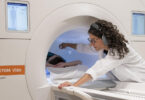Unit coordinator Gurpreet is the first teammate to greet patients – UC support has been critical to this initiative’s success!
Since the COVID-19 pandemic hit, the essential use of face masks and gloves has had a significant impact on interactions between patient and carer. After a cochlear implant patient expressed that she couldn’t understand anyone because she usually reads lips and everyone was wearing masks, the Surgical Day Care team took quick action improve the patient experience.
Surgery nurse Virginia Carlton reached out to the BC Chapter of the Canadian Hard of Hearing Society, who provided with a hard of hearing toolkit for the team at St. Paul’s. Virginia took this kit and built on it, adding and customizing contents, with the end result of a Hard of Hearing Bin and a unit policy to support the practice moving forward.
Surgical team springs into action
“As it was a cochlear implant patient, we endeavoured to have something in place quickly before our next cochlear implant patient came to the hospital,” says Virginia.
The bin contains pen and paper, hard of hearing stickers for the patient chart, Communication Tips for Nurses, and a Hard of Hearing Communication Form for the patient to fill out to provide information about how they communicate.
The team also now utilizes an iPad to communicate that is able to translate in thousands of languages and provide lip reading and sign language tools. Prior to the COVID-19 pandemic, the team used a translation service over the phone that had to be booked in advance and there was no accompanying visual. Between the tools in the Hard of Hearing Bin and the iPad, the surgical team at St. Paul’s is able to provide a much more connected experience for patients during this difficult time.
“The impact of the COVID precautions has been huge – especially for hard of hearing patients that rely so much on visual facial cues – but there is also that comforting piece of reassuring patients with a smile and skin to skin hand holding,” says Virginia. “Currently, patients cannot have family accompany them into the unit. Surgery is a very stressful time and more than ever you need that comfort.”
This project demonstrates how essential the patient voice is in helping address a problem that will improve the care experience for others.
Useful reminders when communicating with someone who is hard of hearing
- Turn and face the person you are speaking to
- It is more important to speak slowly than louder
- Use short sentences, rephrase rather than repeat,
- Remove background noise or wait until it passes
- Be patient!
April 26 – 30th is Patient and Resident Experience Week – an annual, world-wide event honoring health care staff who impact the patient experience through the delivery of person-centred care.





